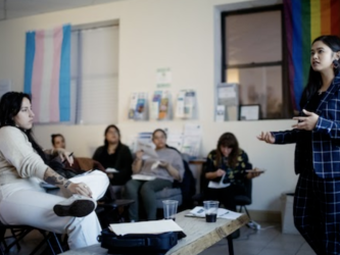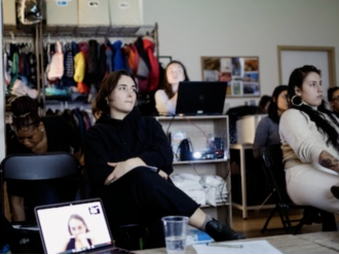Sexual Assault Crisis AdvocateNorth Brooklyn Coalition Against Family Violence proudly offers the 40-hour comprehensive, New York State Certified Rape Crisis Advocate training. Our trained advocates provide immediate on-call support to survivors of sexual assault in the emergency department at partnering NYCHH Woodhull Hospital.
|
What is a Survivor Advocate’s Role?
When a survivor seeks post-trauma medical treatment and forensic examination, they must be notified of their rights, including the right to have an advocate from the local rape crisis program present during the entirety of their stay in the emergency department, including the exam and interview. Our advocates are trained to provide time-limited and discrete emotional support, crisis counseling, and knowledge of services to all survivors who present for treatment at Woodhull Hospital.
The Importance of Survivor Advocacy
Survivors of traumatic experiences can present with a range of intrusive acute and pervasive symptoms including memory loss, confusion, anxiety, numbness, and dissociation. These responses to trauma can make it difficult to navigate a complex healthcare and treatment system, wherein survivors must tell their story and consent to intimate and time-sensitive procedures. A survivor advocate uses their understanding of both the short- and long-term effects of trauma to guide their advocacy, effectively ensuring the survivor has the information they need to make their own choices.
Our advocates are trained to provide culturally-competent services that meet the needs of our diverse community.
Our advocates are trained to provide culturally-competent services that meet the needs of our diverse community.
Become a New York State Certified Rape Crisis Advocate
We are currently maintaining a waitlist of applicants for the next available training. Please scroll down for more information.
Rape Crisis Advocate Volunteer Requirements:
- Be at least 18 years old
- Complete North Brooklyn Coalition application and interview
- Complete Woodhull Hospital Volunteer Services application and on-boarding process; for more information, please click here.
- Attend and successfully complete NBCAFV’s 40-hour training; weekend days are required
- Must be able to reach Woodhull Hospital within 20 minutes by car; we can reimburse your car fare
- Can commit to 3 shifts per month, with one being a weekend schedule.
-12:00 AM to 6:00 AM
-6:00 AM to 12:00 PM
-12:00PM to 6:00 PM
-6:00 PM to 12:00AM
- Can commit to being an advocate for 6 months
- Can successfully complete NYS Rape Crisis Advocate Training. As well as, Woodhull's medical, drug, background check, and training.
- Understand that this is an unpaid volunteer program
Tips to Guide Your Conversation as an Ally & a Survivor
For Denim Day NYC 2020, North Brooklyn Coalition Against Family Violence collaborated with Day One and STEPS to End Family Violence to draft these tips for allies and survivors who want to speak with friends, family, colleagues, or acquaintances about what we can all do to end sexual violence.
As a Survivor:
Sharing your experiences and thoughts about sexual assault with someone can be difficult. Here are some things to keep in mind that we hope may make it a little easier.
Sharing your experiences and thoughts about sexual assault with someone can be difficult. Here are some things to keep in mind that we hope may make it a little easier.
- You’re in control of what you share. Whether you disclose a personal experience with someone is completely your choice. Share as much or as little information about your experience as you like. If someone asks you a question and you’re not comfortable answering, you don’t have to. Try thinking about what boundaries you’d like to set ahead of time, and feel free to articulate them at the start of your conversation. It’s okay to be direct.
- Select a format that works best. Is this a conversation you’d like to have in person, by phone, by text, or by email? Is the space you’re in quiet and private? Do you want it to be a quick chat or something more in depth? Try to block off enough time to talk without feeling rushed, so that you’re able to leave feeling heard.
- Decide what you want to get out of the conversation. Do you want to share your personal story with someone you’ve never told? Do you want to simply be heard? Do you want to open up a dialogue with a coworker about creating better sexual assault prevention trainings and policies? Do you want to have a group chat with friends to brainstorm advocacy methods? If it’s helpful, consider jotting down a few key points that can guide your conversation.
- How you tell your story is up to you. Would it be easier to create art, write a story, or compose a song that expresses your experiences, thoughts, and feelings? If so, you can think about who, if anyone, you’d like to share it with.
- Prepare for all reactions. Ideally the conversations you have will be overwhelmingly positive. However, there is always the chance that someone may not respond the way you would hope or might make an insensitive remark. It’s okay to end communication early. Try saying something like “Thanks for listening, but we seem to have very different perspectives on this issue.” or “I’m feeling upset by your response and think it’s best we pick this up another time.”
- You can always continue the conversation another time. Do you want to plan additional time to talk? If so, you can decide to do that before you end the conversation or you can let the person know you’d like to reach out to schedule something at a later time.
- Develop a self-care plan. What can you do before and after the conversation to attend to your mental and emotional health? Try making a list of things that might help (going for a walk, meditating, journaling, having a cup of tea, reading, etc.). For more information on self-care, activeminds and ted.com offer a range of resources including tips and videos.
- Build a support system. Sharing your story or talking about the issue of sexual violence can bring up a lot of thoughts and feelings. Identify at least one person (friend, family member, therapist, service provider) whom you trust to confide in. Make a plan to check in with them after each conversation that you have.
- Be kind to yourself. Sharing your experiences and thoughts about a difficult subject isn’t always easy. Try to acknowledge the bravery it takes to be open and vulnerable with someone, and to be proud that you took this step.
Providing Support to Survivors as an Ally:
Hearing someone’s experiences and thoughts about sexual assault can be difficult. Here is some general information to help you be as supportive as possible.
- Acknowledge the survivor’s courage. It takes trust and strength to share your story. By sharing their story with you, survivors take the risk that they might be judged, disbelieved, blamed, or shamed. Thank survivors for trusting you enough to tell you their experience.
- Let the survivor set their own boundaries. It may be tempting to ask questions with the intention of understanding a survivor’s experience, but not everyone will feel comfortable sharing certain information. Consider asking the survivor if there’s anything they’d rather not talk about before the conversation starts. If the survivor says they don’t want to talk about something, or if they avoid answering, do not push them. Let them set the scope and pace. Affirmative statements such as, “Sharing can be hard. Definitely take your time and only share what you feel comfortable sharing.” will convey empathy and understanding without the use of probing questions.
- Consider the format. If the survivor wants to talk by phone, are you in a quiet place with privacy? If they want to text or email, can you make sure that no one else has access to those communications? Do you have sufficient time to dedicate to the conversation? If not, consider explaining the situation to the survivor and suggesting to reschedule at another date and/or time that works for them.
- Be mindful of your reactions. It is best practice to avoid asking “Why?” questions. “Why?” questions can sound judgmental and pressure the survivor for an explanation or response. Questions and statements like, “Why didn’t you call the police?”, “You should’ve been more careful.” or “How long are you going to be depressed about this?” can be victim-blaming and make the survivor shut down. Again, consider saying something like, “I’m so sorry you went through that.” or “This was not your fault.”
- Consider checking in after the conversation. Regardless of how long ago the event occurred, the survivor may still feel the impact. Talking about the event may also be triggering and cause them retraumatization. Knowing that you’re still there and thinking about them may be helpful. They may not reply right away (or at all); try not to take that personally.
- Know what resources are available. Your support is important, but there may be things (legal advice, mental health services, etc.) that are beyond your abilities. You can find a list of resources on our website to help the survivor access a variety of services. You can also encourage them to engage in self-care practices.
- Be aware of your own feelings and devise a support system. Whether or not you yourself are a survivor of sexual assault, hearing someone’s stories may bring up feelings of discomfort or distress. Try thinking about what self-care practices you can engage in after the conversation. Identify at least one person (friend, family member, therapist, service provider) whom you trust to confide in. Make a plan to check in with them if you need to.
North Brooklyn Coalition Against Family Violence supports all survivors affected by sexual violence. If you want to speak with a professional, our clinicians and case managers are available to provide therapeutic and counseling services at no-cost. Please contact 718-302-4073 or [email protected] to begin your intake today.




